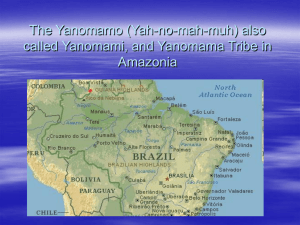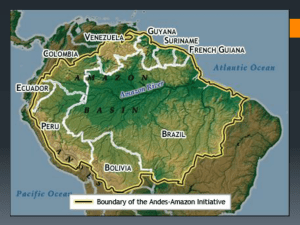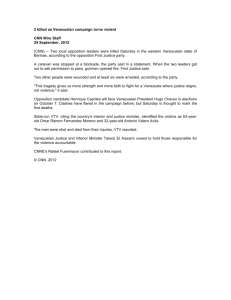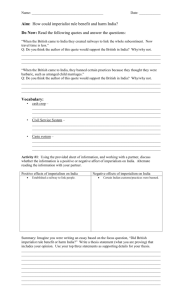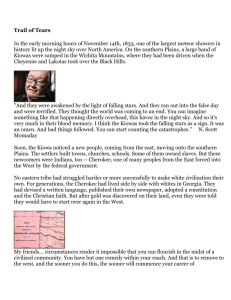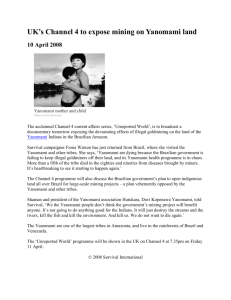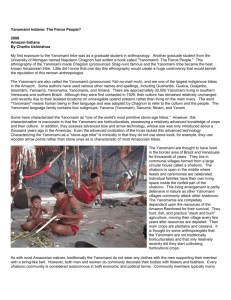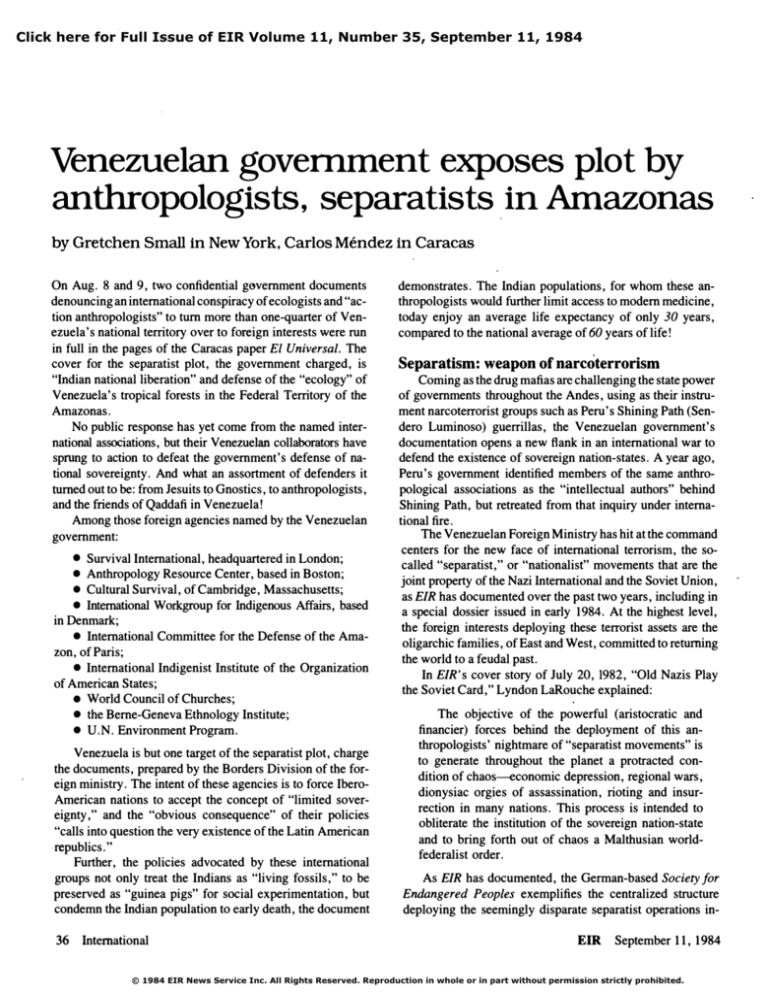
Click here for Full Issue of EIR Volume 11, Number 35, September 11, 1984
Venezuelan governrnent exposes plot by
anthropologists, separatists in Amazonas
by Gretchen Small
in New York, Carlos Mendez in Caracas
On Aug. 8 and 9, two confidential government documents
denouncing an international conspiracy of ecologists and "ac­
tion anthropologists" to tum more than one-quarter of Ven­
ezuela's national territory over to foreign interests were run
in full in the pages of the Caracas paper El Universal. The
cover for the separatist plot, the government charged, is
"Indian national liberation" and defense of the "ecology" of
Venezuela's tropical forests in the Federal Territory of the
Amazonas.
No public response has yet come from the named inter­
national associations, but their Venezuelan collaborators have
sprung to action to defeat the government's defense of na­
tional sovereignty. And what an assortment of defenders it
turned out to be: from Jesuits to Gnostics, to anthropologists,
and the friends of Qaddafi in Venezuela!
Among those foreign agencies named by the Venezuelan
government:
•
Survival International, headquartered in London;
Anthropology Resource Center, based in Boston;
• Cultural Survival, of Cambridge, Massachusetts;
• International Workgroup for Indigenous Affairs, based
in Denmark;
• International Committee for the Defense of the Ama­
zon, of Paris;
• International Indigenist Institute of the Organization
of American States;
• World Council of Churches;
• the Berne-Geneva Ethnology Institute;
• U.N. Environment Program.
•
Venezuela is but one target of the separatist plot, charge
the documents, prepared by the Borders Division of the for­
eign ministry. The intent of these agencies is to force Ibero­
American nations to accept the concept of "limited sover­
eignty," and the "obvious consequence" of their policies
"calls into question the very existence of the Latin American
republics. "
Further, the policies advocated by these international
groups not only treat the Indians as "living fossils," to be
preserved as "guinea pigs" for social experimentation, but
condemn the Indian population to early death, the document
36
International
demonstrates. The Indian populations, for whom these an­
thropologists would further limit access to. modern medicine,
today enjoy an average life expectancy of only 30 years,
compared to the national average of 60 years of life!
Separatism: weapon of narcoterrorism
Coming as the drug mafias are challenging the state power
of governments throughout the Andes, using as their instru­
ment narcoterrorist groups such as Peru's Shining Path (Sen­
dero Luminoso) guerrillas, the Venezuelan government's
documentation opens a new flank in an international war to
defend the existence of sovereign nation-states. A year ago,
Peru's government identified members of the same anthro­
pological associations as the "intellectual authors" behind
Shining Path, but retreated from that inquiry under interna­
tional fire.
The Venezuelan Foreign Ministry has hit at the command
centers for the new face of international terrorism, the so­
called "separatist," or "nationalist" movements that are the
joint property of the Nazi International and the Soviet Union,
as EIR has documented over the past two years, including in
a special dossier issued in early 1984. At the highest level,
the foreign interests deploying these terrorist assets are the
oligarchic families, of East and West, committed to returning
the world to a feudal past.
In EIR's cover story of July 20, 1982, "Old Nazis Play
the Soviet Card," Lyndon LaRouche explained:
The objective of the powerful (aristocratic and
financier) forces behind the deployment of this an­
thropologists' nightmare of "separatist movements" is
to generate throughout the planet a protracted con­
dition of chao�conomic depression, regional wars,
dionysiac orgies of assassination, rioting and insur­
rection in many nations. This process is intended to
obliterate the institution of the sovereign nation-state
and to bring forth out of chaos a Malthusian world­
federalist order.
As EIR has documented, the German-based Society for
Endangered Peoples exemplifies the centralized structure
deploying the seemingly disparate separatist operations in-
EIR
September 11, 1984
© 1984 EIR News Service Inc. All Rights Reserved. Reproduction in whole or in part without permission strictly prohibited.
South America's Amazon Countries
--- ---.
,­
.:s.t· '"
c:;:;,.��'!i.:
'p
.
J
i
l
..
Colombia \
posal came from the Anthropology Department of the Insti­
proposed the creation of a Yanomami Biosphere Reserve
(
,,�.->';
j
/
Peru (
extending over 40,000 square kilometers in which some
\........ .
<.:...r'J'�'_'_�)
""'-' ,.
p... . .... . .... !
Ecuador
human zoo from which Venezuelan armed forces and police
activity would be restricted or excluded entirely. One pro­
tuto Venezolano de mvestigaciones Cientificas (IVIC), which
\.. Venezuela ;.
'-'-'J
zonas Territory a "World Heritage Site," establishing a Yan­
omami National Park-a sort of internationally controlled
�
".j
.,JJAMAZON
only inhabitants allowed. Similar in scope was the proposal
for a Yanomami Indian Reserve by the La Salle Foundation,
the Catholic order which has cooperated with the Jesuits in
anthropological projects in the region for some
i..·-·L.\,/·i.__
j
( Bolivia
....1
Brazil
'-'-.
\�._
'-.
8,000
Yanomami Indians-and their "protectors"-would be the
30 years.
When charges that the Amazonas had become a haven
for drug-running and subversion broke this summer, the gov­
ernment named a multi-sectoral Commission to investigate
the situation. Joining in the outcry against the government
investigation were:
ternationally. Headed by the queen of Denmark, the Society
The Society of Jesus: the Order sprang to the defense of
for Endangered Peoples brings together activists from the
one of its most radical members, the Basque Jesuit Father
neo-Nazi movement with funding and activists from Libya,
Korta, accused of deploying his Indian association against
offering its support to separatist operations ranging from the
any "non-Indian" colonizers in the area. Korta, the spitting
Basque ETA to the Sendero Luminoso-supporting South
image of Nicaragua's Ernesto Cardenal, had formed an "In­
American Indian Council.
dian rights" association called the Union Makiritare of Alto
Survival International is the English-speaking branch of
the Endangered Peoples Society, and Cultural Survival a
corresponding association-two of the groups charged by
the Venezuelan Foreign Ministry.
Ventuari (UMAV) in
1972. It claims ancestral rights over all
the territory.
Libya's Friends: Several members of the Organizing
Committee for the
1981 Green Book Conference in Caracas,
financed by Libya's Qaddafi and bringing together terrorists
The Amazon: a narcoterrorist zoo?
Isolated and underpopulated, with few border controls,
from around the world, have attacked the Amazonas inves­
tigation. Co-chairman of the Green Book Conference Dom­
the Amazon center of South America has become one of the
ingo Alberto Rangel launched a campaign attacking the im­
major routes for South American drug-running, exemplified
position of "progress as capitalist civilization understands it"
by the leading role played by the Hong Kong-modeled "free
in the Amazonas as "genocide" against the Indians.
port" in the Brazilian Amazon, Manaus, in the distribution
With Rangel in the Green Book Organzing Committee
of Colombian cocaine. Clandestine airstrips cover the Ama­
was Esteban Emilio Mosonyi, one of the anthropologists
zon in every country, used equally for gold-smuggling, drug­
cited in the foreign ministry document. Mosyoni, a member
running, and contraband.
of the Societe des Americanistes, is a fanatic proponent of
As in other Amazon countries, competing "anthropol­
the creation of separate Indian nations, arguing that "the
ogical missions" of both right and left ideologies have carved
movement of oppressed minorities towards their self-deter­
out "their" Indian populations to "defend" in Venezuela's
mination constitutes a universal phenomenon," as demon­
Amazonas Territory, making up the majority of the "popu­
strated with such European "independence" movements as
lation" in the area. In the Amazonas, it has been the funda­
the Basques and the Corsicans.
mentalist "New Tribes" pitted against "Theology of Libera­
The Gnostic Church of Venezuela: Walter Marquez, a
tion" projects led by Basque Jesuit, Rev. Jose Maria Korta,
Congressman for the MAS party and leading member of the
20 before a parlia­
and the Movimiento Al Socialismo Party. All equally agree
Venezuelan Gnostic Church, argued Aug.
that the Indians must be "protected" from modernization.
mentary commission that the Indians have primordial rights
Now, the international agencies of terrorism are making
over the Amazonas region, charging the issue of "sovereign­
their bid to "internationalize" major chunks of the Amazon
ty" was simply an effort to "distract" public opinion. Mar­
region-thus removing
quez's role on the Anti-Drug Commission in Congress was
all threat of govemment action against
the expanding outlaw activities.
recently questioned by the Andean Labor Party of Venezuela,
In the Venezuelan case, government preemptive action
due to Marquez's connections with the Universal Gnostic
against the separatist plot was provoked by the revival of two
Movement of Colombia, implicated in drug-running and
separate, but converging, proposals for declaring the Ama-
kidnapping.
EIR
September
1 1, 1984
International
37
Selections from: "Distortions of the Indian Problem Present
in Some Projects, " published on Aug. 8 in EI Universal.
which took place in Barbados.
If indeed the title and organizers call attention to them­
1) At the international level, a constantly accelerating
selves, even greater doubts are raised by the text of the "Dec­
movement is gaining strength which seeks to apply to the
laration of Barbados for the Liberation of the Indian." It
Amazon area principles which, on the one hand, reflect the
states, in effect:
doctrine of "limited sovereignty" and, on the other, attempt
to internationalize the Amazon as the "Common Patrimony
of Humanity. " This strategy shows itself through indirect
pressures, which are aimed primarily at the themes of protec­
tion of the Indians and of the tropical forests.
To this end, the weakening of the signatory states of the
Amazon Cooperation Treaty is sought, inducing them to
accept mechanisms which permit certain international organ­
isms, governmental and non-governmental, to interfere in
the sovereign decisions of those states on questions of popu­
lation, territory and resources. . . .
These policies, induced from abroad, require for their
success the collaboration of people who, within each coun­
try, actively support them in their objectives. . . .
The Indians of America continue to be subjected
to a colonial relationship of domination . . . a position
which negates the possibility that the Indians can free
themselves of colonial domination and decide their
own future. . . .
In the declarative section, we observe the section which
defines "the responsibility of Anthropology":
The anthropology which today is required in Latin
America is not that which takes the Indians as mere
objects of study, but that which sees them as a col­
onized people and commits itself to their liberation
struggle. . . .
The proliferation of activities by certain anthropologists,
[The First Technical Meeting on the Problems of the
ecologists, and sociologists promoting the presentation of
Indian Populations of the Amazon Region, in Puyo, Ecuador
"projects for the creation of Indian or ecological reserves" is
in July 1981 and the VIII Interamerican Indigenist Congress
not accidental, but rather causal, whose final outcome is to
in Mexico, 1980, produced] recommendations and resolu­
gain the acceptance on the part of the Venezuelan state of the
tions which threaten directly, clearly and inequivocally:
criteria of "limited sovereignty" and "Common Patrimony of
a) National Unity, an essential element for the states
Mankind. " Also not to be overlooked is the interest of groups
involved, through demands for recognition of the "Indian
tied to the international left in carrying out campaigns on
nationalities" and their "right to self-determination";
behalf of the "human rights of the Indians". . . .
b) the territorial integrity of the Latin American states,
2) a) Protection of the tropical forests . . . constitutes an
as a consequence of the recognition of "exclusive territorial
important element in the process of internationalizing the
rights" of these "nationalities" over territorities which are
Amazon.. . . This movement has had such success that,
drawn up on the basis of criteria of "historical occupation,"
under the concept of "ecological protection," within Vene­
without taking into account existing national borders;
zuela "territorial parentheses" (parks, reserves) have been
c) the sovereignity of the state over national resources,
created covering more than one-quarter of the total land sur­
by establishing the necessity of signing "accords between
face of the country. .. . . The consequence has been that the
the governments and indian peoples for the prospecting and
Venezuelan state has limited its capacity for full exercise of
exploiting of hydrocarbons and minerals. " In addition, the
its sovereignty in the areas thus affected. . . .
b) Protection of the Indians: Without real concern for
their integral development and incorporation in the rest of the
fruits of these exploitations should directly benefit the "In­
dian nationalities" and be administered directly by them,
and not by the State to the collective benefit of the nation;
nation (Art. 77 of the National Constitution), but instead with
d) the policy of integration, consolidation, and popu­
the purpose of recognizing "autonomous Indian nationali­
lating of national territory, through the paralyzing and elim­
ties," which should enjoy the "right to self-determination,"
inating policies and projects for· populating and the socio­
and with whom the State should "negotiate" the exercise of
economic development of these areas, particularly in the
sovereignty over territory, population, and natural resources.
border areas;
This brings as a consequence the weakening and eventual
e) the Latin American identity, as a product of a fusion
dismemberment of the State, increasing its vulnerability to
of races and cultures, through the attempt to establish forms
manipulation by interests foreign to its own. . . .
of ethnic segregation.. . .
It becomes interesting to study the coincidence of inter­
3) It is evident that such recommendations cannot but
ests active around natural resources and the strategic impor­
affect, directly and negatively, the existing elements of the
tance of countries like Venezuela. In this regard, we observed
State: nation and territory-one, indivisible and sovereign.
that, in January of 1971, the World Council of Churches and
The obvious consequence would be to call into question the
the Institute of Ethnology of Berne-Geneva concocted a
existence itself of the Latin American republics, inasmuch
"Symposium on Inter-Ethnic Friction in South America"
as in the end the latter would tend to fragment into multiple
38
International
EIR
September 11, 1984
"nations" and eventually confederations of Indian republics
would arise."
Selections from: "An Analysis of the Proposals for the Cre­
ation of a Yanomami Reservation in the Amazonas Federal
Territory"
The most recent expressions of these policies are crystallized
in the projects for the creation of Indian reserves along the
length and breadth of the Venezuelan border, areas of con­
centration for the different tribes and where the presence of
the State is extremely precarious....
- The proposed Reservation would cover approximately
40,000 square kilometers and would include a population
of about 8,000 Yanomami Indians, which would represent
a population density of 0.2 inhabitants per square kilo­
meter....The reserve would border on Brazil for an ex­
tension of 850 kilometers....
The . .. Project suffers from a double constitutional
fault: First, it wrongly, and in a biased manner, interprets
some of the constitutional guidelines, and secondly, contains
principles clearly violating the letter and spirit of the basic
guidelines of the Constitution:
a) Integrity and Unity of National Territory: It is not
accidental that, in its preamble, the Constitution states among
its objectives the maintenance of the independence and ter­
ritorial integrity of the Nation, and the strengthening of its
unity.
a.1) It is important to point out that this initiative tends
to further weaken the already weak and precarious presence
of Venezuela at its borders, through the creation of a ter­
ritorial and juridical parenthesis which tends to pull the
Yanomami out from national jurisdiction.To this end, they
attempt to submit them, in some manner, to international
guardianship through the application of the concept of "Patrimony of Mankind"...("World Heritage Site" in the language of UNESCO)....
a.2) Upon examining the section, "Aspects of Security
and Defense" of the Project, it is equally notable that it
poses:
-the necessity of exercising "strict vigilance and control
over the policies which the Venezuelan State establishes for
this culture in order to guarantee its self-managed existence."
-That "...the Security and Control Organisms of the
Reservation [evacuate] all persons foreign to the Yanomami
ethnic without due authorization from the zone."
-"...That the zone contiguous with the border with
the Republic of Brazil be common territory of the Yanomami
people...."
The juridical implications of the term "autogestion" and
its derivation to "self-determination" are as obvious as the
proposal for the creation of a supranational entity, super­
imposed over the borders of Venezuela and Brazil.
Em
September 11, 1984
If we combine this with the evacuation of all those
foreign to the Yanomami ethnic group, we would be falling
into the creation of Bantustans like those of South Africa....
b) The Constitution, by including in both its preamble
and in Article 61 the prohibitions [against discriminations
for race, sex, creed or social condition] is doing nothing
other than registering one of the principles which make up
the national identity as mestizaje. which ...accelerated in
this century, has resulted in the full fusion of races and
cultures into a nation, one and indivisible.
b. 1) It is paradoxical that the evident consequence of
projects such as these is the introduction into Venezuela of
a policy of ethnic discrimination, a national version of South
African apartheid. ...The result of isolating the Yanomami
from all direct, personal, social, economic, and cultural
contact with the rest of the nation would be to segregate
them in fact and in law.In this regard we observe that the
[Yanomami Reserve] Project in its "Suggestions for the
Regulation of the Reservation" and in the aspects relating
to "Security and Defense," states that:
-For those not belonging to the Yanomami culture, the
only activities allowed within the restricted zone are those
of patrol and border control, those of scientific investigation,
and those of medical assistance for emergency situations....
-"The National Guard will avoid within the realm of
possibilities contact with the Yanomami population."
b. 2) The practical results of the application of the con­
cepts embedded in the Project is tantamount to forgetting
that the Venezuelan Indians enjoy full juridical rights, and
to submit them to a caretaker regime, which in the final
analysis would place them among the incompetent: minors,
outcasts, and prodigals.
In this way, far from helping the Yanomami to incor­
porate themselves as full citizens, it removes from them any
possibility of enjoying the benefits of scientific and tech­
nological advances which the rest of humanity enjoys. It
assigns them the role of living fossils and treats them like
guinea pigs in a scientific research laboratory [emphasis in
original].
Symptomatic are the regulations which limit the access
of the Yanomami to medical attention, particularly when it
is taken into account that the average lifespan of the Indians
is 30 years, in sad contrast to the national average of ap­
proximately 60 years....
Another expression of the State's sovereignty is precisely
its exclusive jurisdiction over the natural resources of its
territory.As already indicated, one of the objectives which
certain international circles pursue is to weaken the sover­
eignty and State Control over the resources which it has
been given by Nature ....
From this listing it can be seen that the objective is to
impede the possibility of exercising effective control over
the zone.
International
39

